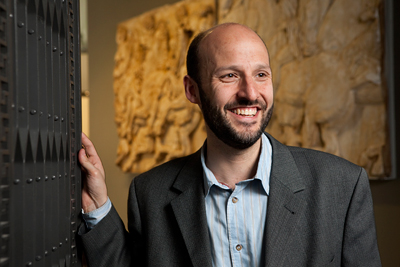Expert: Muslims -- and astrology -- saved civilization, in cooperation with Jews and Christians
By Linda Glaser

The Muslims and their interest in natural science (which to them included astrology) saved civilization by translating and studying Greek texts, thus keeping Greek knowledge alive, said Peter Adamson, professor of ancient and medieval philosophy, King's College London, delivering the second College of Arts and Sciences Humanities Lecture April 13.
The translation movement began in the ninth century under the Abbasids, the second Islamic caliphate, Adamson explained. The Muslim interest in Greek texts was fueled, to a large extent, by competition with the Byzantium empire and the practical benefits of Greek natural science, including mathematics, medicine and especially astrology.
Although the translations of Greek texts were paid for and supervised by Muslims, the work was mostly done by Christian monks and Jews who first translated the works into Syriac, a Semitic language, and then into Arabic, he said. "The Muslims saving civilization were doing it in cooperation with Christians and Jews," said Adamson.
Philosophy -- as distinct from theology -- was a new concept in the Muslim empire. Arabic had to borrow the Greek word for philosophy, "philosophia," turning it into "falsafa." The term thus carried an air of foreignness about it, Adamson said.
But in the 11th century, Avicenna, arguably the most influential figure in the history of Arabic philosophy, deliberately set out to supplant Aristotle and create a philosophical system for Muslims. "His successors recognized him as a 'main event,'" said Adamson. "They stopped writing commentaries on Aristotle and started writing them on Avicenna."
The study of Arabic philosophy is crucial to understanding Western thought, Adamson said, because Arabic was a unifying language for philosophical and theological discussions for Christian, Jewish and Islamic scholars. Both Thomas Aquinas and Maimonides studied Avicenna and learned Aristotle through Arabic translations. "You can't understand late medieval or Renaissance philosophy without understanding the Muslim world," said Adamson.
Nevertheless, some people still question the impact of Islam on Western thought. "Outside of the confines of places like Cornell where people are clued in, Arabic philosophy is not what people think of as a part of the canon," said Adamson in an interview. "But we're getting there. It helps that most of our political attention is pointed toward Islamic issues now."
As someone not very familiar with Arabic philosophy, Rong Ma '10, an English and biology major, said he hadn't encountered the topic in any classes. "It was nice to hear how Muslims spread philosophy through the ages. I'm definitely going to look into it more."
Adamson's books include "The Philosophical Works of al-Kindî," "Al-Kindî (Great Medieval Thinkers)" and "The Arabic Plotinus: a Philosophical Study of the Theology of Aristotle." He is also co-editor of the "Cambridge Companion to Arabic Philosophy" and author of numerous articles.
The College of Arts and Sciences' Humanities Lecture Series features emerging leaders in humanities fields, including theorists whose work span disciplines.
Linda Glaser is a staff writer in the College of Arts and Sciences.
Get Cornell news delivered right to your inbox.
Subscribe